- Home
- Gregory Ashe
Transposition Page 2
Transposition Read online
Page 2
“My friend,” Somers said. “We’ve been pretty patient with you.”
“Not me,” Hazard said, scribbling through the citation form.
“Well, I’ve been pretty patient, at least. Let me give you some free advice: you’d have done a whole lot better in this situation if you’d been polite.”
“Yeah?” The young man was practically spitting he was so angry. He stomped down the road, fumbled through the car, and returned with the license and registration for Hazard. “I hope you remember that advice when you’re scrubbing toilets. My lawyer is going to have both of you busted out of the department so fast you won’t have time to swing your big balls.”
Somers, easy-going Somers, had dark lines of color above his cheekbones now, but when he spoke, his voice had the same casual charm it always did. “You want to hear a joke?”
“Fuck you.”
“You’ll like it. I know you’ll like it. You know what the difference is between a police officer and a janitor?”
The young man’s fingers dug furrows through his beard, and he glared down the road, doing his best to ignore Somers.
“When you’re a janitor,” Somers said, “the pieces of shit don’t talk back.”
A chuckle ripped through Hazard for a moment before he could stifle it, and out of the corner of his eye, he could see the young man’s features twisting in rage. Hazard finished transcribing the information, and he passed back the license with the citation.
“Have a very nice day, Mr. Bequette.”
Gene Bequette, the young man with the beard in need of combing, slammed the door. He must have felt safe because he rolled down the window. “You think I don’t recognize you? You’re that faggot the police hired. Must be your wet dream, huh? And the real police get a nice, gaping asshole they can use whenever they want.” Then he drove away so fast that he almost slid off the road again. Tires screeching, the car skidded back onto the highway and disappeared into the distance.
“Talking pieces of shit?” Hazard said as he turned towards the Impala.
“So much for the Somerset charm. Let me see your shoulder.”
“I’m fine.”
“Bullshit.”
“I get enough babying from Nico, Somers.” Hazard climbed into the Impala, and Somers followed him. “I don’t need it from you.”
“What you need—”
“Don’t say it.”
“—is enough common sense not to push a car with a bad shoulder.”
“Too late.”
“I offered, but you were too—”
Before Hazard could learn what he was—too pigheaded? that seemed likely—his phone rang, and Nico’s name flashed on the screen.
“Don’t kill me,” Hazard said when he answered.
Nico laughed. “Don’t kill me as in, I need to catch the shuttle? Or don’t kill me as in, you’re fleeing the country to Mexico?”
“Neither. I’m just running late. We caught a call last minute.”
“Tell him hi,” Somers said, elbowing Hazard.
Hazard ignored his partner. “I’ll try to make dinner, but we might have to skip it and sprint to the airport.”
“Oh man. I’m making steak a lo pobre. And potatoes. And salad.”
Stomach rumbling, Hazard said, “I’ll take the first two.”
“And a salad. I’ve seen your refrigerator. Do you and Somers even own anything that grew in the sun?”
“Does hamburger count?”
“Is he talking about our fridge?” Somers said. Leaning towards the phone, he shouted, “Hi, Nico.”
Nico didn’t respond, but judging by the chilly silence that followed, he’d heard Somers loud and clear.
“Anyway,” Hazard said, trying to ease into that icy gap, “I’ll get there as fast as I can. Somers says it won’t take long.”
“Yeah, sure. That’s what Somers says.”
“What’s that?”
“Nothing.” Nico sighed. “See you when you get here.”
Hazard disconnected the call and slumped into his seat. Overhead, thunder cracked loudly enough that he could hear it over the tires’ thrum. A line of darker clouds was moving in—or was that just the end of the day, the sky growing darker? Hazard couldn’t tell, but he didn’t like it. The drive to the airport would be a real bitch if those clouds opened up.
“Did Nico say hi?” Somers asked.
“What?”
“Nico, did he say hi?”
Hazard thought about lying, then shrugged. “We were talking about getting to the airport.”
“He hates me.”
Hazard shrugged again.
“Don’t deny it.”
“We’ve had this conversation about forty times. I don’t really know what you want me to say.”
“I want you to admit he’s jealous.”
“Jesus, Somers, just let it go. Maybe you’re just not his kind of person.”
That seemed to sting Somers; he drew himself up, hands squared on the steering wheel, his face pinched as he looked out the window. Under his breath, but still loud enough for Hazard to hear, he muttered, “I’m everybody’s kind of person.”
Trying to cover a sigh, Hazard slumped farther into the seat. He really needed a vacation.
THE WOMAN RUSHED OUT of the house screaming. It wasn’t a hysterical, hands-flung-in-the-air scream. It was . . . methodical. The woman, drying her arms with a dishtowel, stepped down the walk towards the Impala with a firm, even pace, screaming at a moderate, sustainable level. She even paused in her walk, still screaming, to collect a bedsheet hanging from a clothesline. The bedsheet looked like it was frozen solid, and it was probably as hard as iron, but the woman hammered it into a smaller rectangle and kept on screaming.
Inside the Impala, Hazard watched her coming with a mixture of dread and curiosity. She looked like a relic from another time: her hair, a mousy brown gone mostly to gray, must have been quite long because it was coiled in two separate buns on top of her head. Wrinkles soured her face, pulling her mouth into a tart pucker. She wore a long, faded apron that looked like it had been scrubbed long and hard and consistently since about 1932, and under the apron she had on a housedress patterned with enormous lilies on a turquoise background.
“Batsy Ferrell,” Somers said. “She’s ancient, obviously, but she could probably work the Terminator into the ground. Look, she still dries her laundry on the line in the middle of winter.”
“Maybe she can’t afford a dryer. Or the electricity.” Hazard studied the house. Situated at the end of an unpaved dirt road, so far off the highway that Hazard was sure they’d gotten lost, it was a small structure, a single-story farmhouse that probably dated to the beginning of the century. Over the years, the building had sagged, splaying outwards slightly, as though afflicted with a bad case of rickets. A few ghostly lines of white paint suggested the original color; now, though, bleached wood stared back at Hazard.
“She owns a couple thousand acres of land out here. Everything over to the Petty Philadelph, which is part of the problem.”
“Why’s that?”
But before Somers could answer, Mrs. Ferrell had reached the car and was hammering on the hood with both hands, still screaming in that eerie monotone. The frozen sheet scraped along the hood, and although it might just have been a layer of frost, Hazard could have sworn that it was scratching up the paint.
“All right, Mrs. Ferrell, all right. We’re here.” Somers was already out of the car and moving around the front, both hands held out as though he wanted to take her into a hug and let her give him a kiss on the cheek. “You’re all right, we’re all right, everything’s going to be ok.”
Hazard stifled a smart remark and got out of the car, his leather wingtips slick in the half-frozen slush. Everything was not going to be ok if Hazard missed Nico’s dinner. He wished Somers would tell Mrs. Ferrell that.
“My good boy,” Mrs. Ferrell said, her voice raspy, as though she’d screamed herself out of a few vocal chords
. The words were accented and sounded eastern European to Hazard’s ear. “My good, sweet boy, you are wrong. I am being murdered. They will kill me, they with their guns, they will shoot me dead.” She mimed putting a pistol to her head. “This is what they do, the men in power. This is what they did in my home. Understand? They will come and they will take what they want. They will shoot you dead. They will shoot me dead.”
“Nobody’s going to shoot you dead,” Somers said. He took her by the hands and squeezed. “Let’s get you inside, Mrs. Ferrell, and let’s get you a cup of tea.”
“No tea,” she sniffed. “Vodka.”
“That sounds about right,” Hazard muttered.
Mrs. Ferrell’s sharp eyes flew to Hazard. “And who is this black one? Who is this one with the face like he would smash me, smash me like a hammer on a nuts, how do you say, nuts at Christmas?”
“This is my partner, Detective Hazard. He’s not going to smash anything.”
“Pick it up, Somers,” Hazard muttered.
“He will watch when they shoot me dead,” Mrs. Ferrell said. “He will dance on my grave.”
“He won’t dance on anyone’s grave, Mrs. Ferrell. Nobody’s going to shoot you. Let’s go inside.” Somers turned Mrs. Ferrell towards the house, prizing the sheet from her hand and hustling her along the clay walk. Over his shoulder, Somers threw Hazard a glare. “Fix your face,” he whispered.
“What the hell—”
But before Hazard could frame the question, Somers had turned back to Mrs. Ferrell, talking to her in a low voice and helping her into the old farmhouse.
There was nothing wrong about Hazard’s face. He was sure of it. Well, almost sure.
By the time Hazard caught up with them, Somers was stepping through the door, and Hazard followed them into the house. Like its outside, the old farmhouse’s interior had seen better days. Sun-bleached cross-stitches hung on the walls, with homilies like Bless This Mess and Home Is Where The Heart Is. The work had a stiff, impersonal quality, as though they’d been chosen out of a sense of obligation rather than any true sentiment. Worn furniture with split cushions and sagging foam filled the room. The only thing that seemed clean and well-maintained were the dachshunds. Hundreds of dachshunds: glazed ceramic, photographs cut out of magazines, crayon drawings, plush animals, dachshunds crammed every spare inch of the room. Somers had to clear at least a dozen of them, piling them neatly in his arms, before Mrs. Ferrell would sit. Hazard decided he’d stand.
The old woman was going on and on, still wailing about death and being shot, when Somers cut through her words with, “Now, Mrs. Ferrell, it was only the shooting range. You know that sometimes—”
“No.” She said it with such force that Somers went silent. “No, this time, they kill me. They shoot me dead, just like in my country.”
Somers seemed puzzled, and that surprised Hazard in turn. Until now, Somers had handled the situation as though it were a routine. This had thrown him off his tracks, though, and he bit his full lower lip and studied Mrs. Ferrell.
“What happened?”
“They shoot,” she said, waving her hands with bewildered insistence. “They shoot.”
“Show me.”
Somers lent the old woman his arm, helping her from the seat, and she led him deeper into the farmhouse. Hazard studied the building as he followed. If Batsy Ferrell truly were wealthy—even if that wealth were tied up in land—the house showed no sign of it. They passed two sparsely furnished bedrooms, the quilts threadbare and the walls unadorned. One of the windows was cracked, and Hazard noticed now that the interior was barely any warmer than outside.
Mrs. Ferrell led them past a cramped water closet—there was no sign of a shower or tub, just an old-fashioned toilet with an overhead tank and a wire hanger serving as an impromptu pull—and into the kitchen. Decades of cooking grease darkened by dust and dirt covered every surface, with the patina broken by a crumpled ball of aluminum foil, by the battered bottom of an overturned kettle, by a stainless steel fork missing a tine. The odor of burned meat hung in the room, and it wasn’t a recent odor—it smelled like a hundred years of ground beef burning on the bottom of the pan. The whole place was a mixture of poverty and neglect that made Hazard’s stomach flip and filled him with both pity and wariness.
“There. They shoot there, they shoot, they shoot.” Mrs. Ferrell had stopped at a door leading into a cramped pantry. Somers stepped inside, and Hazard watched through the doorway as his partner navigated the narrow path between shelves of tinned tomatoes and enormous mason jars full of green, floating things. Somers stopped at the end of the pantry, raising up on his toes to study a window high in the far wall.
“There’s a hole,” he called back to Hazard.
“They shoot,” Mrs. Ferrell insisted. Her gaze flicked to Hazard and then moved resolutely back to Somers. “They shoot, they shoot.”
Hazard felt a prickle of uncertainty. Was there something wrong with his face?
“It’s the right size,” Somers called. Then, with less confidence, “Might have been a rock.”
Hazard lined himself up with the window at the end of the pantry. Then he turned, his gaze moving up the kitchen wall, studying the daisy-print wallpaper, the chipped laminate countertop, the cabinets that looked like they’d been beaten within an inch of becoming scrap. He took a step forward, narrowing his area of focus, and then another step. When he reached the cabinets, he ran his thumb over their front.
“Yeow,” he said as a splinter stabbed his finger. Blood was already welling from the wound, and Hazard sucked the wounded finger, grateful for the taste of blood.
“What?”
Hazard tried to speak and almost bit his finger off. Removing the digit from his mouth, he rapped the cabinet with a knuckle. “Found it.”
FROM THE PANTRY, SOMERS peered across the kitchen, trying to see what Hazard meant.
“You found what?”
“The bullet.”
That was all. Somers felt a surge of concern and irritation. Concern for Batsy Ferrell who had, it seemed, been shot at. And irritation for Hazard’s perpetual resistance to talking.
Forging a path through rotted sacks of meal and near-to-toppling shelves of canned goods, Somers cleared the pantry and crossed to where Hazard stood. His partner had his index finger in his mouth and was sucking absently on his finger. It was, for Somers, distracting to say the least. With an effort of will, he shoved certain thoughts—certain very specific thoughts, thoughts about the two times emotion and desire had threatened to spill over in his relationship with Hazard—and focused on the cabinet door.
The bullet looked like a nine millimeter, and it was buried halfway through the wood. “Good thing it was particle board,” Somers said, shutting the cabinet. “Would you stop that?”
Hazard, his dark brows knitted together, managed to say, “I’m bleeding,” with his finger still stuck in his mouth.
That was classic Hazard, Somers thought. The big, hulking brute was a study in conflicts: massively muscled, bigger and meaner than Somers, and brilliantly analytical, he was also aggressive, short-tempered, and quiet bordering on silent. Even Hazard’s hair showed the strange alloy of temperaments: cut and parted in a conservative style, the dark hair was long, almost too long for regulations. Hazard must have sensed Somers’s study because he popped his finger out of his mouth, his pale skin mottling with a blush, and his eyes—the color of autumn corn, scarecrow eyes—grew hard and brittle.
“What?”
“Nothing. Let’s get some pictures. And let’s get the first aid kit before you give me an aneurysm sucking on your finger.”
“What’s that supposed to mean?”
Somers let a smirk stretch his face. “You know exactly what it means, big boy.”
Hazard’s blush deepened, and Somers fought a laugh as he trotted out to the Impala.
They worked well together; the Cervantes case had made sure of that. Somers still felt uncertain of how Hazard saw their re
lationship. It had shocked Somers to no end that Hazard had accepted his invitation to become roommates, and he still wasn’t sure what, exactly, had been Hazard’s reason. Beyond that, Somers wondered what his partner thought of him. In the last few weeks, as Somers had begun repairing his relationship with his estranged wife, he had managed to bring his drinking under control. That, Somers was sure, had helped him gain some of his partner’s trust. But part of Somers still wondered whether Hazard believed he was a good detective. After all, Renard Upchurch had been Somers’s partner, and Upchurch had almost managed to get away with murder right under Somers’s nose.
Whatever Hazard’s feelings about Somers, though, he never showed them—he rarely showed any feeling, for that matter, which tended to drive Somers into trying to bait an emotion out of his partner. Today was no different; as they worked through Mrs. Ferrell’s house, taking pictures and measurements, digging the bullet free from the cabinet, exploring the overgrown brush closest to the house in hopes of spotting signs of a trespasser, Hazard remained characteristically silent and Somers did his best to break that silence.
When they’d finished, they knew little more than when they’d started. “We didn’t see any signs that someone had come near the house,” Somers said, squeezing Mrs. Ferrell’s bristly hands. “It’s dark, though, so it’s hard to tell. It was probably an accident. A hunter, maybe.”
“No accident,” Mrs. Ferrell said. This close, it was hard not to notice the smell of pickled cabbage that clung to her, mixing with the mustiness of old wool and unwashed hair. “They shoot. A hundred times, they shoot. And I see.”
“One,” Hazard said, his voice carrying the same quiet menace it usually did. “There was one bullet. One broken window.”
“A hundred times,” Mrs. Ferrell cried, her watery eyes fixed on Somers. “A thousand. They shoot like madmen. They line me up and shoot me with all the bullets in the world. The men, they want me dead. You know these men. I cry to the police. I tell them these men, they want me dead. And what do the police do?” She wrestled her hands free from Somers and turned them palm-up, as though she had no words for the Wahredua PD’s lack of help.

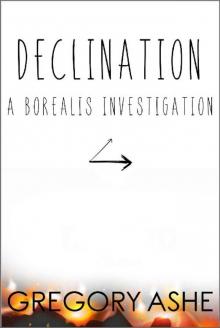 Declination
Declination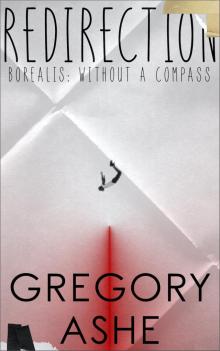 Redirection
Redirection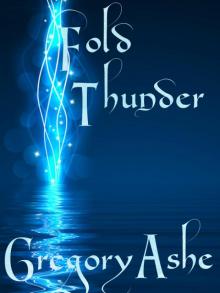 Fold Thunder
Fold Thunder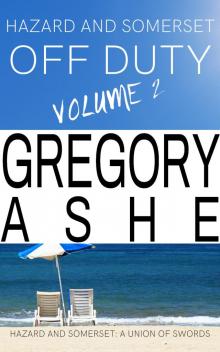 Hazard and Somerset
Hazard and Somerset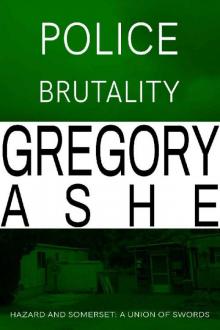 Police Brutality (Hazard and Somerset: A Union of Swords Book 2)
Police Brutality (Hazard and Somerset: A Union of Swords Book 2) Wayward
Wayward The Same End (The Lamb and the Lion Book 3)
The Same End (The Lamb and the Lion Book 3)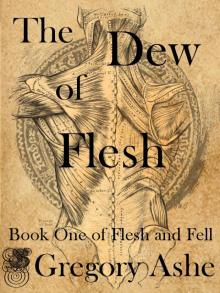 The Dew of Flesh
The Dew of Flesh The Same End
The Same End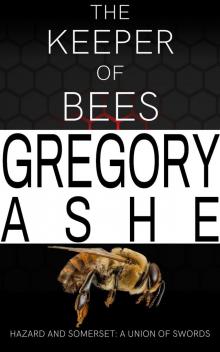 The Keeper of Bees ARC
The Keeper of Bees ARC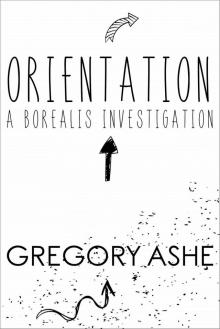 Orientation (Borealis Investigations Book 1)
Orientation (Borealis Investigations Book 1) The Indifferent Children of the Earth
The Indifferent Children of the Earth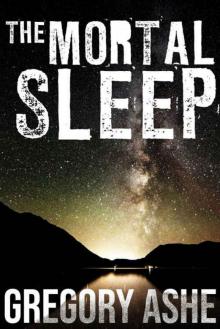 The Mortal Sleep (Hollow Folk Book 4)
The Mortal Sleep (Hollow Folk Book 4)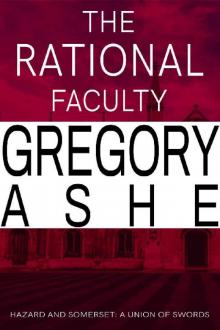 The Rational Faculty (Hazard and Somerset: A Union of Swords Book 1)
The Rational Faculty (Hazard and Somerset: A Union of Swords Book 1) The Weeping Lore (Witte & Co. Investigations Book 1)
The Weeping Lore (Witte & Co. Investigations Book 1)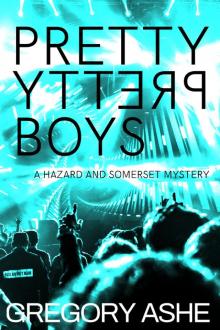 Pretty Pretty Boys
Pretty Pretty Boys Transposition
Transposition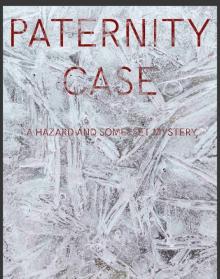 Paternity Case
Paternity Case